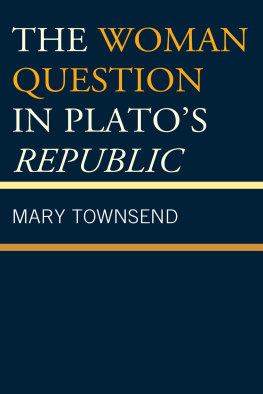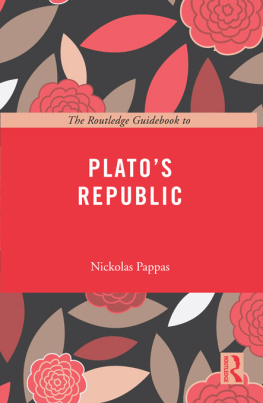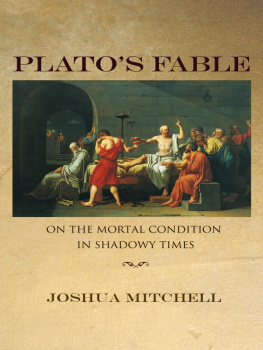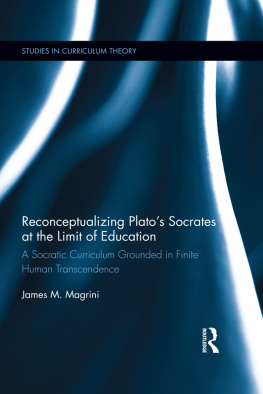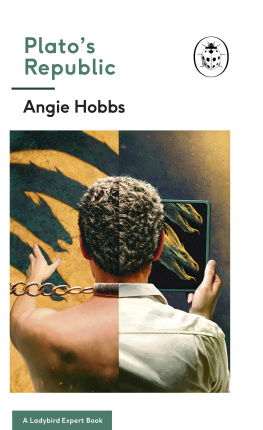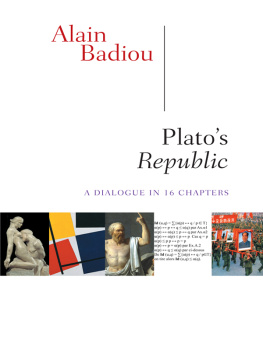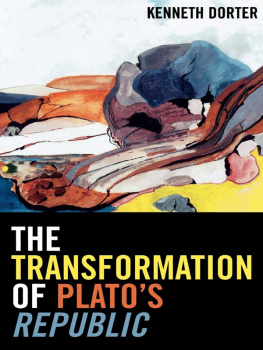James L. Kastely - The Rhetoric of Platos Republic
Here you can read online James L. Kastely - The Rhetoric of Platos Republic full text of the book (entire story) in english for free. Download pdf and epub, get meaning, cover and reviews about this ebook. year: 2015, publisher: University of Chicago Press, genre: Science. Description of the work, (preface) as well as reviews are available. Best literature library LitArk.com created for fans of good reading and offers a wide selection of genres:
Romance novel
Science fiction
Adventure
Detective
Science
History
Home and family
Prose
Art
Politics
Computer
Non-fiction
Religion
Business
Children
Humor
Choose a favorite category and find really read worthwhile books. Enjoy immersion in the world of imagination, feel the emotions of the characters or learn something new for yourself, make an fascinating discovery.
- Book:The Rhetoric of Platos Republic
- Author:
- Publisher:University of Chicago Press
- Genre:
- Year:2015
- Rating:5 / 5
- Favourites:Add to favourites
- Your mark:
- 100
- 1
- 2
- 3
- 4
- 5
The Rhetoric of Platos Republic: summary, description and annotation
We offer to read an annotation, description, summary or preface (depends on what the author of the book "The Rhetoric of Platos Republic" wrote himself). If you haven't found the necessary information about the book — write in the comments, we will try to find it.
The Rhetoric of Platos Republic — read online for free the complete book (whole text) full work
Below is the text of the book, divided by pages. System saving the place of the last page read, allows you to conveniently read the book "The Rhetoric of Platos Republic" online for free, without having to search again every time where you left off. Put a bookmark, and you can go to the page where you finished reading at any time.
Font size:
Interval:
Bookmark:
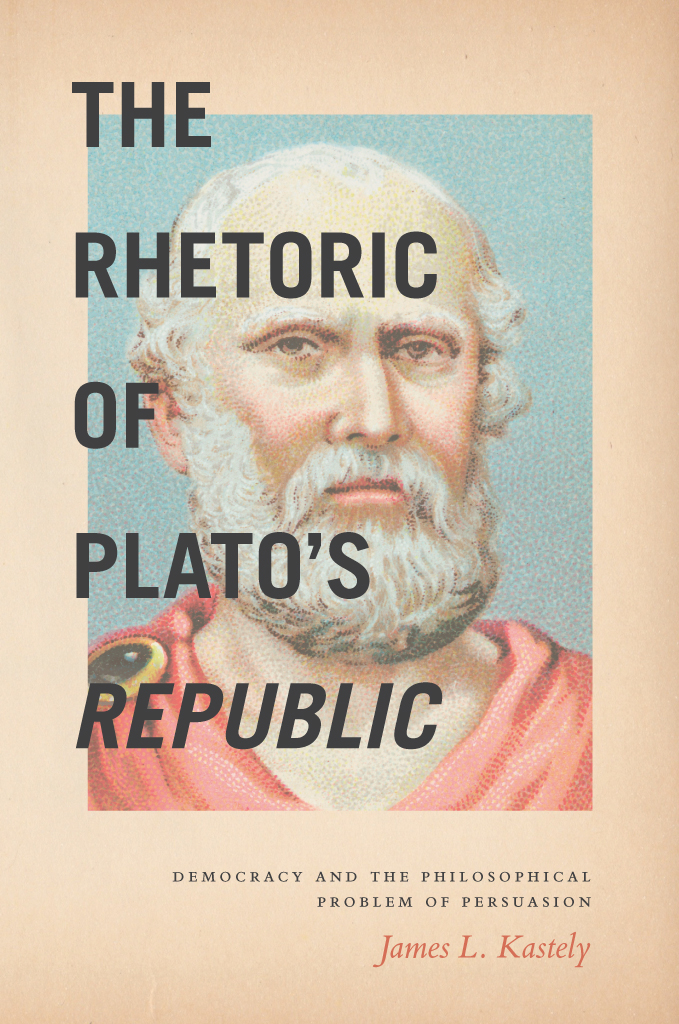
JAMES L . KASTELY
THE UNIVERSITY OF CHICAGO PRESS
CHICAGO AND LONDON
JAMES L . KASTELY is professor of English and director of the Creative Writing Program at the University of Houston. He is the author of Rethinking the Rhetorical Tradition: From Plato to Postmodernism.
The University of Chicago Press, Chicago 60637
The University of Chicago Press, Ltd., London
2015 by The University of Chicago
All rights reserved. Published 2015.
Printed in the United States of America
24 23 22 21 20 19 18 17 16 15 1 2 3 4 5
ISBN-13: 978-0-226-27862-9 (cloth)
ISBN-13: 978-0-226-27876-6 (e-book)
DOI: 10.7208/chicago/9780226278766.001.0001
Library of Congress Cataloging-in-Publication Data
Kastely, James L., 1947 author.
The rhetoric of Platos Republic : democracy and the philosophical problem of persuasion / James L. Kastely.
pages ; cm
Includes bibliographical references and index.
ISBN 978-0-226-27862-9 (cloth : alk. paper) ISBN 978-0-226-27876-6 (e-book) 1. Plato. Republic. 2. DemocracyPhilosophy. 3. Persuasion (Rhetoric) 4. Philosophy, Ancient. I. Title.
JC71.K37 2015
321'.07dc23
2014049393
This paper meets the requirements of ANSI / NISO Z39.48-1992 (Permanence of Paper).
FOR LYNN , WHO DANCES IN THE CHORUS OF THE SAME GOD .
I have always been drawn to thinkers and writers whose work cannot be easily categorized. It cant be an accident that I keep finding myself writing on thinkers like Plato and Kenneth Burke. Their work continually invites or forces me to rethink what I thought I knew. They are like Daedaluss sculptures in the Menothey just dont stay put. This is especially true with Plato. He, more than anyone else, has helped me understand the philosophical importance of rhetoric and the depth of certain issues that are foundational for rhetoric. His philosophical attention to those fundamental issues has helped me navigate what it means to be, as Burke would have it, an animal born into language.
Although I felt that I had contributed what I had to say on the work of Plato and Burke and swore to myself that I would write no more on either of them, I have found once again that Burke and Plato have challenged me to revise and expand my understanding of one of rhetorics most basic activities: persuasion. I have found myself, almost despite myself, writing yet again on and in response to them.
To understand persuasion better, I first turned to Burke and his understanding of the dialectical relationship between persuasion and identification. That led to my essay Love and Strife: Ultimate Motives in Burkes A Rhetoric of Motives (Rhetorica 31.2 [2013]: 17298). Plato had, as I originally imagined this project, a small role to play in a larger study of persuasionI thought I might focus one chapter, and maybe not even that, on a dialogue or two that examined what Plato had to say about persuasion. But as I reread the Republic, the importance of Platos thought on persuasion became evident to me. I began to appreciate that, for him, persuasion posed a fundamental problem for philosophy. In the Republic, philosophys difficulties with persuasion call into question the meaningfulness of philosophic discourse. Persuasion is Platos focal point for raising the questions of whether philosophy has a practical role to play in human affairs, and especially of whether it can contribute to those efforts that seek responsible ways to live in an imperfect world. In the Republic, these questions are about the possibility of philosophic discourse contributing to the well-being of nonphilosophers. For Plato, the central question of the dialoguewhether a genuinely persuasive defense of justice is possibleis not a theoretical problem; rather, it is a practical question about the effectiveness of philosophic discourse.
The need for a genuinely persuasive defense of justice arises from a fundamental threat to democracy. In democratic Athens, as represented in the dialogue, the underlying sentiment among the citizenry is that no one really desires to be just and that, at best, justice represents a compromise between the desire for unlimited power and the fear of what others might do to one if those others had such power. The defense of justice is an especially pressing problem because the standard arguments put forward in its defense have inadvertently promoted injustice and led to a false understanding of the natural appeal of injustice. As Plato sees it, democracies face an inherent rhetorical crisis in which it is difficult, if not impossible, to justify the very values that are foundational for those political orders.
The way in which Plato frames the problem of persuasion conveys that, whatever else it is, the Republic is a major work of rhetorical theory investigating the possibility of an effective radical discourse that is culturally transformative. Platos concern with rhetoric differs from that of theorists who focus on persuasion as part of normal political discourse. He is interested, instead, in the possibility of a discourse that challenges the inherited understanding of a culture. For this type of discourse, persuasion is a particularly vexed issue because, at least initially, its claims are counterintuitive and contradict what nearly everyone takes to be an understanding grounded in and confirmed by reality as it is experienced on a daily basis. Glaucon and Adeimantus, the dialogues main interlocutors, point out to Socrates that if the people said what they truly believed, then they would have to confess that they prefer to act unjustly if they could get away with it. The average citizen values justice principally as a compromised solution that protects the person from the potentially aggressive acts of those powerful individuals who would otherwise not be inhibited from acting on their natural desire to pursue freely their own interests and trample over the lives of others. Given the common perception that people naturally desire injustice, the Politeia (normally translated as the Republic but meaning something like constitution) needs to investigate the ways in which individuals and cities are constituted by the cultures that they inherit. Since discourse plays an important role in such constitution, it becomes an issue for rhetoric, on both the individual and political levels, and since the constitution of an audience is a question of the shaping of their ethical and political character, rhetoric, as an art of constitution, is a concern for philosophy.
It is evident early in the dialogue that the Republic is a work of self-interrogationit is an act of philosophy investigating whether philosophy has the possibility of contributing to the promotion of justice in the everyday world in which injustice is likely to persist. Plato uses Book 1 and the opening of Book 2 to orchestrate a set of events highlighting the failure of a philosophic discourse based on Socratic refutation. He defines the problem rhetorically: Socratic discourse fails because it persuades few, if any, of those who hear it of the correctness of its insights. This failure is evident in the characters response to Socratess refutation of the rhetor, Thrasymachus. Glaucon comments that Socratess victory over Thrasymachus is meaningless because it does not speak to what people really believe and why they believe it. Socratess failure is particularly important because it is one in a long line of failed defenses, and the absence of a single persuasive defense of justice lends strong support to the prevalent belief that what people really value is injustice. The failed defenses of justice raise questions about what is required for a genuinely persuasive defense. And that, in turn, raises a question about what is entailed for a discourse to be persuasive. This question of persuasion becomes particularly important for philosophy because philosophy is in the difficult position of addressing an audience of nonphilosophers who have little reason to credit philosophic discourse with any authority.
Font size:
Interval:
Bookmark:
Similar books «The Rhetoric of Platos Republic»
Look at similar books to The Rhetoric of Platos Republic. We have selected literature similar in name and meaning in the hope of providing readers with more options to find new, interesting, not yet read works.
Discussion, reviews of the book The Rhetoric of Platos Republic and just readers' own opinions. Leave your comments, write what you think about the work, its meaning or the main characters. Specify what exactly you liked and what you didn't like, and why you think so.

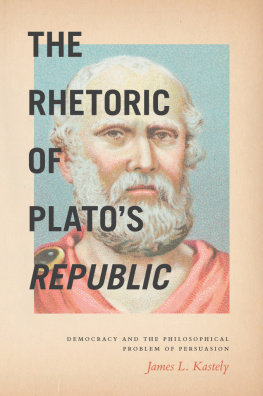
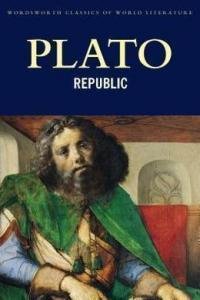
![Averroes on Platos Republic [trans. Ralph Lerner] (Cornell - Averroes on Plato’s Republic](/uploads/posts/book/324094/thumbs/averroes-on-plato-s-republic-trans-ralph.jpg)
